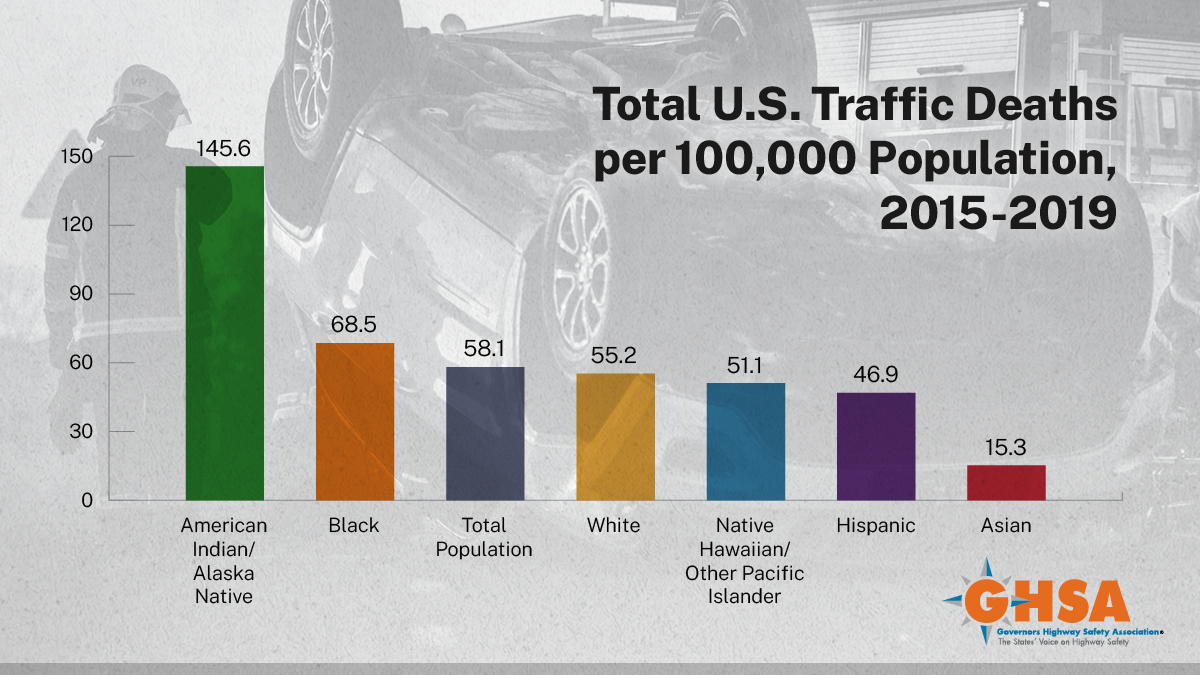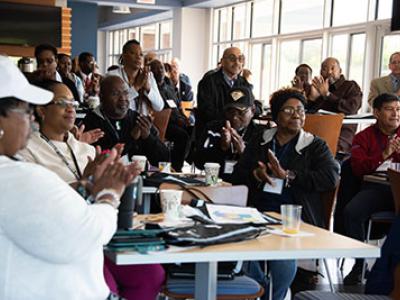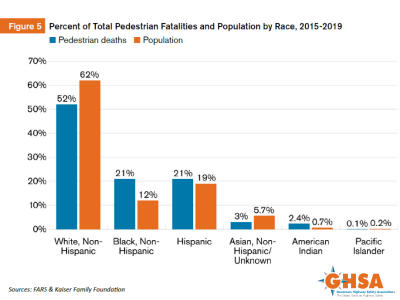Black, Indigenous and People of Color (BIPOC) in the United States experience historic and systemic racism that impacts all aspects of life, including transportation, which is intertwined with socioeconomic status, housing, education, health care, employment and more.
GHSA PolicyClick here to view GHSA's policies and priorities on equity. |
GHSA is committed, through leadership, culture change, training and accountability, to advance reforms that help achieve racial justice and equity for all road users. Amid a national discussion about social justice and the role of law enforcement in community safety, in 2020 GHSA issued recommendations to State Highway Safety Offices (SHSOs) and their partners on how to advance equity in traffic enforcement. At the same time, the association reaffirmed the critical role law enforcement plays in traffic safety particularly through the proven countermeasure of high visibility enforcement (High-Visibility Enforcement: Assessing Change and Identifying Opportunities, NHTSA).
To gain a better understanding of race-related disparities in traffic safety, GHSA conducted an analysis of the five most recent years of data (2015-2019) on fatal traffic crashes. The analysis confirmed that BIPOC are killed in traffic crashes at a higher rate than the U.S. average (An Analysis of Traffic Fatalities by Race and Ethnicity, GHSA). Separately, the National Highway Traffic Safety Administration reported that roadway deaths of non-Hispanic Black persons increased 23% in 2020 from the year before (Early Estimates of Motor Vehicle Traffic Fatalities and Fatality Rate by Sub-Categories in 2020, NHTSA). Research also confirms that drivers strike and kill BIPOC traveling on foot at a higher rate than expected given their share of the population (Pedestrian Traffic Fatalities by State: 2020 Preliminary Data, GHSA).
GHSA commissioned consulting firm Kimley-Horn to produce recommendations that the association, SHSOs and their partners, and the traffic safety community to support more equitable outcomes for people of color. The resulting report, Equity in Highway Safety Enforcement and Engagement Programs, included ten recommendations intended to help broaden the reach of the nation’s highway safety programs by eliminating racial disparities in traffic safety engagement and enforcement.
Equity and Engagement Committee
In early 2023, GHSA formed a new Equity and Engagement Committee to address key barriers to advancing equity in highway safety programs, promote greater outreach and engagement in underserved communities and guide GHSA efforts to prioritize equity in all the association’s initiatives. The committee co-chairs – Shelly Baldwin, Director, Washington Traffic Safety Commission; and Licet Gaveau, Executive Director, New York Governor's Traffic Safety Committee – also serve on the GHSA Executive Board.
The Equity and Engagement Committee guides the association’s work to advance equitable safety outcomes by, among other things:
- Steering GHSA engagement with SHSOs, partners, policymakers, the media, the public and others.
- Recommending, developing and overseeing training and resources for SHSOs to comply with National Highway Traffic Safety Administration (NHTSA) regulations in ways that advance equity and engagement.
- Directing GHSA’s engagement on equitable traffic enforcement.
- Developing and recommending changes to GHSA’s policies and priorities.
- Advising on GHSA federal relations and association communications.
- Evaluating and guiding GHSA partnerships.
Achieving robust and sustained progress in preventing fatalities and injuries in BIPOC communities requires a comprehensive approach that includes five E’s: Enforcement, Engineering, Education, Emergency Medical Response and Equity. Equity is essential and cannot be separated from the other E’s – it must permeate every traffic safety effort.
While high visibility enforcement is a proven countermeasure for changing driver behavior, the relationship between police and BIPOC communities is frayed. Fostering positive engagement between law enforcement and the communities they serve is essential for building the trust and understanding necessary to advance equitable outcomes in traffic safety.
Policies and Priorities
In August 2023, GHSA members adopted an updated Policies and Priorities, which reaffirm GHSA’s focus on equity as a guiding principle in all our work. The Policies and Priorities also provide the following GHSA recommendations about equity:
- GHSA urges the highway safety community to institutionalize equity throughout their programs in order to promote diversity in the highway safety discipline, involve more communities and deliver safety services more comprehensively and avoid disparities.
- GHSA encourages all states to broaden community involvement in the highway safety planning process
so diverse communities have a voice in shaping highway safety programs, including the use of traffic
enforcement. - GHSA urges the highway safety community to tailor public outreach and community
programs to optimize their safety impact in diverse communities.
Featured Initiative
Missouri Brings Diverse Communities Together for Traffic Safety Equity and Engagement Summit
To reach more communities and advance equity in its traffic safety programs, the Missouri Department of Transportation (MoDOT) and the Missouri State Highway Patrol (MSHP) held an innovative Equity and Engagement in Traffic Safety Summit on May 2 in Jefferson City.
Read More




